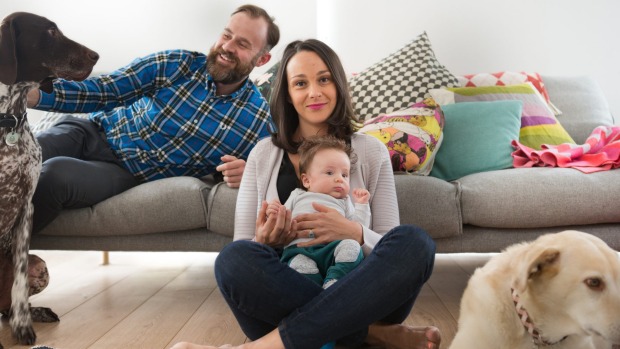
Sasha Milinkovic, her fiance Dan and son Morris Bobby Finch. Photo: Simon Schluter
When someone is told they have cancer, there is an awful lot to think about. But young women who are told they have breast cancer must also weigh up whether the treatment will rob them of the ability to have children.
Sasha Milinkovic was 26 when she was told she had breast cancer, at a time of her life that had all been about “going out and having fun”.
The now 35-year-old counsellor said getting started with cancer treatments had been her top priority, and when she was told she had to think about preserving her fertility it was “the last thing” on her mind.
“I wasn’t thinking about having children but I sort of had to at that point to make sure I made the best long-term decision,” she said.
Breast cancer treatments have the side effect of damaging the ovaries, which can lead to an early menopause. To preserve her fertility a woman can opt to freeze her eggs – which takes time and delays vital cancer treatment – or use a course of drugs that show promise in mitigating the side-effects of chemotherapy on the ovaries.
But because of the urgency of starting treatment, women do not have much time to decide what course to take. Melbourne University breast cancer researcher Michelle Peate said most women only had a small window of about a week from the time of diagnosis.
Ms Milinkovic credits the fertility preservation centre at the Royal Women’s Hospital with helping her make her decision on the best course of treatment.
To help those facing the same predicament, Dr Peate is developing an online tool that will allow women to weigh up different cancer treatments and their effects on fertility. She hopes breast cancer sufferers and their doctors can sit down and input the patient’s health information into the resource to aid them with their decision-making.
“It is a really important consideration because ultimately we don’t want them to take less effective cancer treatments to reduce their impacts on fertility,” she said.
Dr Peate said about 15 per cent of the women diagnosed with breast cancer each year – or about 800 a year – were 40 or younger. Of this group, about 60 per cent would not yet have had children.
Ms Milinkovic beat breast cancer but the treatment compromised her eggs. Since 2012 she had been trying to become pregnant, and had also undergone IVF cycles without success.
“We had resigned ourselves to the fact that maybe it wasn’t going to be and that we wouldn’t have children,” she said. “We have two beautiful dogs and we thought maybe they would be our children.”
When Ms Milinkovic and her fiance Dan got the good news that she was pregnant, it took a few days to sink in, she said.
The Hampton couple welcomed their son Morris Bobby Finch 3½ months ago, and she plans to spend her first Mother’s Day as a mum exactly as she would a regular Sunday.
“Every Sunday I get a coffee and we all go down to the beach to walk the dogs, whether it is rainy or sunny,” she said.
The Royal Women’s Hospital is raising money to buy six bilirubin blankets, which prevent babies with jaundice from being separated from their mothers. Donations: thewomens.org.au/donateblanket/
